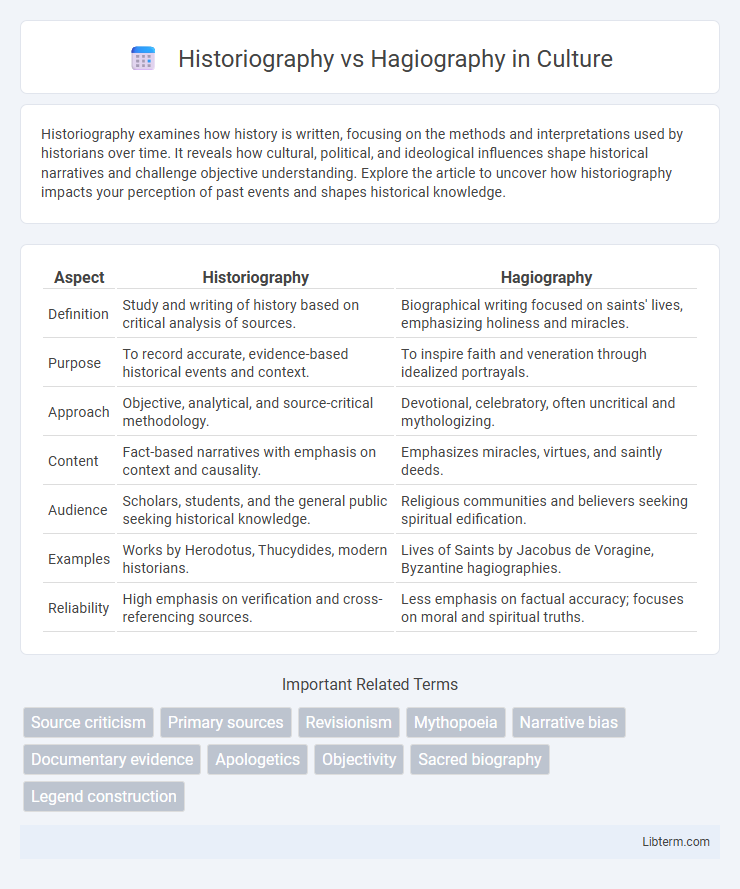Historiography examines how history is written, focusing on the methods and interpretations used by historians over time. It reveals how cultural, political, and ideological influences shape historical narratives and challenge objective understanding. Explore the article to uncover how historiography impacts your perception of past events and shapes historical knowledge.
Table of Comparison
| Aspect | Historiography | Hagiography |
|---|---|---|
| Definition | Study and writing of history based on critical analysis of sources. | Biographical writing focused on saints' lives, emphasizing holiness and miracles. |
| Purpose | To record accurate, evidence-based historical events and context. | To inspire faith and veneration through idealized portrayals. |
| Approach | Objective, analytical, and source-critical methodology. | Devotional, celebratory, often uncritical and mythologizing. |
| Content | Fact-based narratives with emphasis on context and causality. | Emphasizes miracles, virtues, and saintly deeds. |
| Audience | Scholars, students, and the general public seeking historical knowledge. | Religious communities and believers seeking spiritual edification. |
| Examples | Works by Herodotus, Thucydides, modern historians. | Lives of Saints by Jacobus de Voragine, Byzantine hagiographies. |
| Reliability | High emphasis on verification and cross-referencing sources. | Less emphasis on factual accuracy; focuses on moral and spiritual truths. |
Introduction to Historiography and Hagiography
Historiography is the study of historical writing and methods, emphasizing critical analysis, source evaluation, and the pursuit of objectivity in reconstructing past events. Hagiography, in contrast, focuses on the biographies of saints or religious figures, often idealizing or glorifying their lives to inspire faith rather than provide factual accuracy. Understanding the distinctions between historiography and hagiography is essential for interpreting historical texts, as historiography aims for evidence-based narratives while hagiography blends history with devotional elements.
Definitions: Historiography Explained
Historiography refers to the study and writing of history based on critical analysis of sources, aiming to present an accurate and evidence-based account of past events. It involves evaluating primary and secondary sources to construct interpretations that are supported by empirical data and methodologies. In contrast, hagiography focuses on the biography of saints or religious figures, often emphasizing devotional or idealized narratives rather than objective historical accuracy.
Defining Hagiography: Purpose and Origins
Hagiography is a genre of literature that primarily aims to document the lives, virtues, and miracles of saints or religious figures, often serving devotional or didactic purposes rather than objective historical accuracy. Originating in early Christian traditions, hagiographies sought to inspire faith and provide moral exemplars by emphasizing spiritual purity and divine intervention. Unlike historiography, which strives for critical analysis and factual representation of past events, hagiography prioritizes theological significance and veneration over empirical evidence.
Historical Objectivity vs. Religious Idealization
Historiography emphasizes historical objectivity by critically analyzing sources, aiming to reconstruct past events based on evidence and factual accuracy. Hagiography prioritizes religious idealization, often portraying saints and religious figures in a glorified manner to inspire faith, sometimes at the expense of historical accuracy. The contrast lies in historiography's commitment to impartiality versus hagiography's focus on spiritual edification.
Methodologies: Evidence and Narrative Construction
Historiography employs critical methodologies emphasizing primary sources, corroborative evidence, and contextual analysis to construct balanced and objective narratives of historical events. Hagiography prioritizes devotional and ideological purposes, often relying on miraculous accounts and oral traditions, with less concern for empirical validation or chronological accuracy. The contrasting approaches affect the reliability and interpretation of texts, where historiography seeks factual rigor and hagiography aims to inspire faith through exemplary storytelling.
Bias, Perspective, and Interpretation
Historiography critically examines events with a focus on evidence, context, and multiple perspectives, aiming to minimize bias and provide a balanced interpretation of history. Hagiography often emphasizes idealized portrayals of individuals, typically saints or religious figures, resulting in a biased narrative shaped by reverence and spiritual motives. The key difference lies in historiography's commitment to analytical objectivity, while hagiography prioritizes devotional perspective and interpretive embellishment.
Impact on Cultural Memory and Identity
Historiography critically examines historical events with an emphasis on evidence and balanced interpretation, shaping cultural memory by providing a nuanced understanding of past societies and fostering informed identity formation. Hagiography, often idealizing figures through religious or moral lenses, influences cultural identity by reinforcing collective values and mythologizing history, which can both strengthen community bonds and obscure historical complexities. The interplay between historiography and hagiography thus plays a crucial role in how societies remember their past and construct collective identities through selective narratives.
Case Studies: Comparing Key Examples
Historiography critically analyzes historical events through evidence-based research, as seen in Leopold von Ranke's emphasis on primary sources for objective narratives. In contrast, hagiography glorifies religious figures, exemplified by the Lives of the Saints, which prioritize spiritual edification over factual accuracy. Comparing these case studies highlights the divergent aims and methodologies that distinguish scholarly history from devotional biography.
Contemporary Relevance in Academic Discourse
Historiography critically examines historical events using evidence-based methodology, ensuring accuracy and objectivity in academic discourse. Hagiography, by contrast, often idealizes subjects, prioritizing devotional or moral narratives over factual precision, which can compromise scholarly rigor. Contemporary relevance lies in the demand for historiographical approaches to maintain epistemic integrity amidst the proliferation of biased or mythologized accounts in historical research and education.
Conclusion: Bridging Fact and Faith
Historiography seeks to analyze and interpret historical events based on evidence and critical methods, while hagiography emphasizes the idealized and often miraculous lives of saints to inspire faith. Bridging fact and faith requires recognizing the distinct purposes of each approach and appreciating how hagiographies contribute to cultural and religious identity despite their limited reliability as historical sources. Integrating insights from both historiography and hagiography enriches understanding by balancing empirical analysis with spiritual significance.
Historiography Infographic

 libterm.com
libterm.com